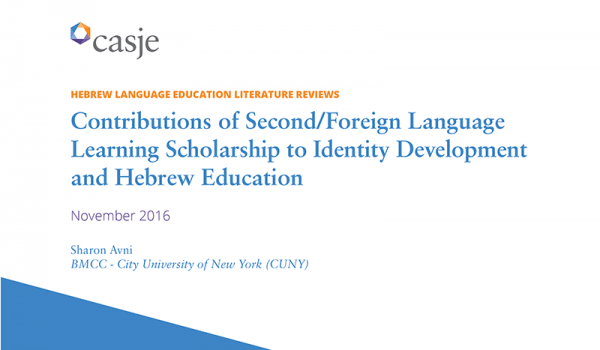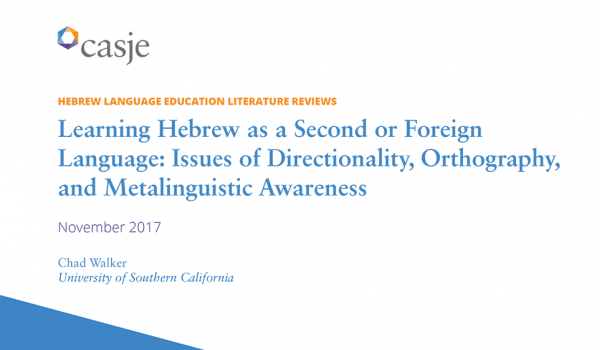CASJE (the Consortium for Applied Studies in Jewish Education) today released the second of three literature reviews that explores what recent research about heritage, second and foreign language learning means for the teaching and learning of Hebrew. The newest review, Contributions of Second/Foreign Language Learning Scholarship to Identity Development and Hebrew Education, looks closely at how second/foreign language acquisition relates to learners’ identity development and their relationships with various cultures, groups and communities. New research focused specifically on Hebrew learning would help Jewish educators understand how their learners both relate to and are influenced by Hebrew.
“Certainly learning Hebrew can have a deep influence on the learner's identity, relationship to the Jewish community, connection to Israel and Israelis, and any number of related areas,” says Sharon Avni, Associate Professor of ESL and Linguistics at BMCC-City University of New York (CUNY), who conducted this literature review. “However, what we see from previous research is that there is no ‘magic formula’—learning a language does not necessarily shape or determine one's social or cultural identity or affiliation. For Jewish educators, policymakers, and philanthropists who want to strengthen youth’s connection to Judaism, both the potential of Hebrew language learning and its limitations are important to bear in mind.”
Avni outlines three key themes— Intergroup Relations and Motivation; Context and Culture; and Language Repertoires and Performance—which she notes yield important findings and reveal significant further questions to explore about Hebrew language learning.
Key findings and questions in each theme include:
Intergroup Relations and Motivation
How a learner feels about being a part of “target language” community may determine her or his language learning success. Moreover, successful second language learning is not necessarily about being internally motivated, but about a person’s access (or lack thereof) to social networks in which they can use the language. For learners, investment in the target language is also an investment in their identity, which constantly changes over time and across contexts.
If American Jews are learning modern Hebrew to identify and connect with the target language group (i.e., Israelis), further research could explore 1) how different Hebrew language learning conditions facilitate or hinder this connection? 2) Is Hebrew the only or best way to facilitate this connection? 3) In what ways do some members of Israeli communities accept or marginalize non-native Hebrew language use or facilitate Americans’ attempts to learn and use Modern Hebrew?
Context and Culture
Foreign/second language novices are socialized through language to become familiar with their community’s ways of thinking, feeling, and acting in the world. Through language they learn about a community’s values, beliefs, and ideologies, a process called “second language socialization.”
This research shows that while some learners may achieve “success,” others may experience ambivalence, resistance to or rejection of the target language culture or community. Thus, future research might explore the relationship between language learning and the process of identifying as a member of a particular community: In what ways are Hebrew language learners—whether learning through social media, preschools, day and sleepaway camps—socialized to think about what it means to become a “speaker of [Jewish] culture”? In what way does the teaching of Hebrew as a second language socialize American youth into particular ways of thinking about themselves as Jews?
Language Repertoires and Performance
Language teachers and learners are engaged in a performance with an audience of spectators in the classroom and with a broader global audience that may not be physically present, but who also either reject or affirm the learners’ new knowledge. One study examines how Israeli shlichim families in the United States learn to recognize and mock Americans’ non-Israeli pronunciations of Hebrew, thereby allowing Israelis to reinforce and blur the boundaries between Israeli and American Jews. By doing so, the shlichim families can claim Israeli authenticity.
“The more we learn about language acquisition, the more we see how much the Jewish education field still needs to learn,” says Sharon Feiman-Nemser, Senior Researcher at the Mandel Center for Studies in Jewish Education at Brandeis and member of the Board of Directors of CASJE, a community of researchers, practitioners, and funders that commissioned the literature review and work to improve the quality of knowledge for the field of Jewish education. “Hebrew language can be a powerful factor in one’s identity and relationships to community and Israel but we need focused and nuanced research to help us understand better under what conditions this does (and does not) happen.”
Read the full review here, and the first piece in the series here.



